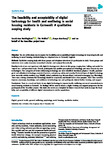The feasibility and acceptability of digital technology for health and wellbeing in social housing residents in Cornwall: A qualitative scoping study
| dc.contributor.author | Buckingham, SA | en |
| dc.contributor.author | Walker, T | en |
| dc.contributor.author | Morrissey, K | en |
| dc.date.accessioned | 2022-02-16T09:39:56Z | |
| dc.date.issued | 2022-01-01 | en |
| dc.identifier.issn | 2055-2076 | en |
| dc.identifier.other | 205520762210741 | en |
| dc.identifier.uri | http://hdl.handle.net/10026.1/18799 | |
| dc.description.abstract |
<jats:sec><jats:title>Objective</jats:title><jats:p> The aim of this study was to explore the feasibility and acceptability of digital technology for improving health and wellbeing in social housing residents living in a deprived area in Cornwall, England. </jats:p></jats:sec><jats:sec><jats:title>Methods</jats:title><jats:p> Qualitative scoping study with focus groups and telephone interviews (23 participants in total). Focus groups and interviews were audio-recorded, transcribed verbatim and analysed thematically. </jats:p></jats:sec><jats:sec><jats:title>Results</jats:title><jats:p> Levels of use and experience with digital technology were diverse in this group, ranging from ‘willing and unable’ to ‘expert’ on a self-perceived scale. Overall, participants had positive perceptions of technology and were keen to try new technologies. Five categories of factors influencing technology use were identified: functional, physical / health, psychological and attitudinal, technology-associated barriers, and privacy, safety and security. Preferred types of digital technology were wearable activity monitors (e.g. Fitbit®), virtual assistants (e.g. Amazon Alexa) and social messaging (e.g. WhatsApp). There was a strong consensus that technology should be easy to use and should have a clear purpose. There was a need to improve awareness, knowledge and confidence in technology use and participants desired further training and support. </jats:p></jats:sec><jats:sec><jats:title>Conclusions</jats:title><jats:p> There is a need and desire to use digital technology to improve health, wellbeing and social connectedness in social housing residents in Cornwall. The findings will be used to inform a digital training and support programme for the participants of the Smartline project. This study also serves as a template for future research that seeks to scope the feasibility and acceptability of different digital interventions in similar populations. </jats:p></jats:sec> | en |
| dc.language | en | en |
| dc.language.iso | en | en |
| dc.publisher | SAGE Publications | en |
| dc.rights | Attribution-NonCommercial 4.0 International | en |
| dc.rights | Attribution-NonCommercial 4.0 International | en |
| dc.rights | Attribution-NonCommercial 4.0 International | en |
| dc.rights.uri | http://creativecommons.org/licenses/by-nc/4.0/ | en |
| dc.rights.uri | http://creativecommons.org/licenses/by-nc/4.0/ | en |
| dc.rights.uri | http://creativecommons.org/licenses/by-nc/4.0/ | en |
| dc.title | The feasibility and acceptability of digital technology for health and wellbeing in social housing residents in Cornwall: A qualitative scoping study | en |
| dc.type | Journal Article | |
| plymouth.volume | 8 | en |
| plymouth.journal | DIGITAL HEALTH | en |
| dc.identifier.doi | 10.1177/20552076221074124 | en |
| plymouth.organisational-group | /Plymouth | |
| plymouth.organisational-group | /Plymouth/Users by role | |
| plymouth.organisational-group | /Plymouth/Users by role/Academics | |
| dcterms.dateAccepted | 2021-12-27 | en |
| dc.rights.embargodate | 2022-02-19 | en |
| dc.identifier.eissn | 2055-2076 | en |
| dc.rights.embargoperiod | Not known | en |
| rioxxterms.versionofrecord | 10.1177/20552076221074124 | en |
| rioxxterms.licenseref.uri | http://creativecommons.org/licenses/by-nc/4.0/ | en |
| rioxxterms.licenseref.startdate | 2022-01-01 | en |
| rioxxterms.type | Journal Article/Review | en |



